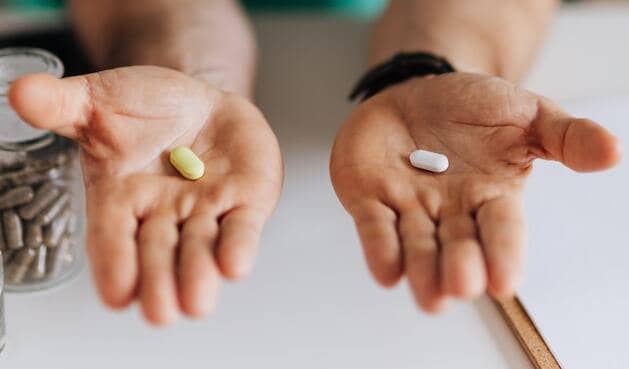HSV-1 vs HSV-2: What’s The Difference?

The common herpes virus is categorised into two different types, which can be confusing when deciding which to get tested for. In this blog post, our sexual health team explain the difference between HSV-1 and HSV-2, the common symptoms that present with each, and the best way to get tested for herpes.
What’s the difference between HSV-1 and HSV-2? The herpes simplex virus can affect both the oral and genital regions. HSV-1 is mainly spread through mouth-to-mouth contact and primarily causes oral herpes. HSV-2 is usually transmitted sexually and is responsible for genital herpes. HSV-2 usually causes more frequent outbreaks.
Read on to find out more about the symptoms of HSV-1 and HSV-2, and how you can test for the herpes simplex virus.
How Does HSV-1 Differ From HSV-2?
When under a microscope, both types of the herpes virus look similar and often behave in the same way. When outbreaks happen, both HSV-1 and HSV-2 cause painful sores and blisters, which are often accompanied by unusual sensations (such as tingling and burning) in the affected area.
The difference between HSV-1 and HSV-2 is the area in which the outbreaks occur. HSV-1 lies dormant at the base of the neck, which usually causes blisters to form around the mouth and face area, and often presents as a cold sore. HSV-2, on the other hand, lies dormant at the base of the spine, with most outbreaks occurring in the genital and buttocks region.
How Are Oral Herpes and Genital Herpes Outbreaks Triggered?
Both types of the herpes simplex virus are triggered by a multitude of things. Although herpes can lay dormant for a long period of time, outbreaks can be triggered by factors like stress, sun exposure, hormones, friction, and fatigue.
What Is HSV-1?
HSV-1 is the most common type of herpes. Data suggests that almost 70% of the worldwide population carry the HSV-1 virus. This form of the virus primarily affects the mouth and face area in the form of cold sores, which is why it’s commonly referred to as ‘oral herpes’.
What Are The Symptoms Of HSV-1?
Oral Sores
Herpes can cause small, red, painful sores (called cold sores or fever blisters) which mainly affect the lip and mouth area. Sores can also present in the form of blisters, that may burst and leak clear fluid. The sores will usually begin to heal and scab over after around five days.
Unusual Sensations
Before herpes blisters appear, you can sometimes feel a tingling, burning, heat, or itching sensation around the area where the infection will erupt. Antiviral creams can be applied as soon as the sensation is first felt, to help combat the eruption of the cold sores.
How Is Oral Herpes Transmitted?
Oral herpes is transmitted through skin-to-skin contact, usually through kissing someone who carries the virus. In younger people, the virus is most likely transmitted through non-sexual contact with saliva, such as from sharing cutlery, or lip balm.
What Is HSV-2?
HSV-2 is more commonly known as genital herpes, and generally affects the area around the buttocks, penis, and vagina. Genital herpes shares similar symptoms as oral herpes, and is transmitted via skin-to-skin contact. Find out more about genital herpes here, where we discuss symptoms, transmission, and treatment.
What Are The Symptoms Of HSV-2?
Painful Blisters
Similar to oral herpes, genital herpes can present itself as small fluid-filled blisters, which eventually erupt and become painful lesions. Herpes blisters can appear across the genital region and buttocks, lasting up to two weeks, however the sores can last longer if it’s your first outbreak.
Unusual Sensations
Similar to HSV-1, genital herpes outbreaks can also cause unusual itching, burning, or tingling sensations before sores and blisters appear. The tingling usually happens in the same area where the blisters are about to surface.
Painful Urination
Because of the location of the herpes blisters, the urethra could be swollen or blocked, which could make it difficult to urinate. Urine can also cause a painful stinging sensation if it touches the open sores. What’s more, you may also feel a need to urinate more frequently during a herpes outbreak.
Discharge
If you have a vagina, you may notice a change in your discharge. Some people notice discharge having a stronger smell, which can sometimes be described as “fishy” when they are having an outbreak of sores. Penile herpes discharge can look like a thick, clear, or milky liquid that appears on the tip of the penis. This may have an unusual odor, which can be stronger after sex.
High Temperature
You may experience an unusually high temperature and flu-like symptoms during your first genital herpes outbreak (called primary herpes). The flu-like symptoms could include chills, body ache, and headaches. This symptom won’t happen after the first outbreak.
Can Both Types Of Herpes Be Symptomless?
Both oral and genital herpes can lay dormant for a long time, often being symptomless for years. The truth is that most people who contract the herpes simplex virus won’t show any symptoms. Asymptomatic carriers of HSV-1 and HSV-2 can still shed the virus (although this won’t be as much shedding as those with active symptoms).
For full peace of mind, you can get tested for herpes with a blood test screening. If you’d like to find out more about symptomless STDs, read our recent blog post.
How Can You Test For The Herpes Simplex Virus?
Remember, herpes can lay dormant (symptomless) for a long time and forever in some cases, so it’s important to get screened regularly to ensure you aren’t putting your sexual partners at risk.
Your Sexual Health offers private HSV-1 and HSV-2 screenings, which can be done yourself at home or by a nurse, or carried out at our private sexual health clinics in the UK.
Is Herpes Curable?
No, unfortunately, there is no known cure for HSV-1 and HSV-2. There are steps you can take to minimise both genital and oral herpes outbreaks, such as creams and medication. If you’d like to find out information about managing herpes symptoms, read our blog post where we discuss antiviral medications, treatment, and more.
Herpes Screening At Your Sexual Health
To ensure that you don’t unknowingly pass on sexually transmitted infections to your sexual partners, it’s vital that you get STD screening reguarly.
Your Sexual Health are a leading provider of private sexual health tests in the UK. We offer private screening in over 100 clinics nationwide, as well as home visits and comprehensive home testing kits.
Book a private STD test, or get in touch with our friendly team for advice and assistance.
